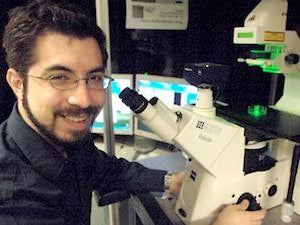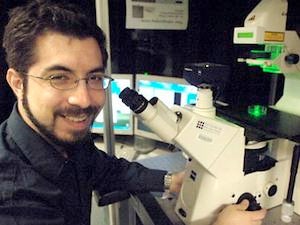 KINGSTON, R.I. – October 21, 2011 – Ed Boyden, associate professor of biological engineering and brain cognitive science at the Massachusetts Institute of Technology, will discuss how to enhance brain activity as the next speaker in the University of Rhode Island’s 2011 Honors Colloquium. The colloquium examines the question, “Are you ready for the future?”
KINGSTON, R.I. – October 21, 2011 – Ed Boyden, associate professor of biological engineering and brain cognitive science at the Massachusetts Institute of Technology, will discuss how to enhance brain activity as the next speaker in the University of Rhode Island’s 2011 Honors Colloquium. The colloquium examines the question, “Are you ready for the future?”
The lecture in Edwards Auditorium begins at 7:30 p.m. on Nov. 1. It is free and open to the public.
In his lecture, Boyden will discuss the technologies he uses to show how emotion and cognition arise from brain network operations governing a range of scientific, medical and sociological concerns. He will also speculate on the astonishing possibilities that will open up in the area of human cognition over the next 10 to 20 years as a result of advances in neurobiology. These advances may include the ability to copy the content of portions of our brains or to augment brain functions by imbedding computer chips into the brain that communicate with adjacent brain regions enhancing or replacing cognitive functions.
Boyden leads the Synthetic Neurobiology Group at MIT where research enabling the systematic repair of chronic pain, Parkinson’s disease, post-traumatic stress disorder and other non-curable brain disorders is conducted. His group has invented ‘optogenetic’ tools that use light to silence and activate neurons. These tools are now used by hundreds of other research groups around the world.
Boyden received three degrees from MIT in electrical engineering and physics and earned a PhD. in neurosciences from Stanford University. He has received numerous awards for his research, including the National Institutes of Health Director’s New Innovator Award and the Society of Neuroscience Research Award. In 2006, Technology Review named Boyden one of the “Top 35 Innovators under 35.” Two years later, Discover Magazine named him one of the “Top 20 Brains Under Age 40.”
The remaining speakers in the lecture series are: cognitive scientist Deb Roy and media researcher Johanna Blakley in a panel on social media (Nov. 8); cybersecurity expert Richard Clarke on cyberwarfare (Nov. 15); and Laurie Zoloth, director of the Center for Bioethics, Science and Society, on ethics and genetics (Nov. 29). The final lecture (Dec. 6) will be presented by 56 honors students, who attend a class complementary to the colloquium. Their focus will be “We Are the Future.”
All of the lectures will be streamed live at www.uri.edu/hc, where the complete schedule of events is also listed. For additional information about the URI Honors Colloquium, contact Deborah Gardiner at debg@uri.edu or 401-874-2382.
Major sponsors of the Honors Colloquium are the G. Unger Vetlesen Foundation, the URI Honors Program, and the URI Graduate School of Oceanography, with sustaining sponsors including The Mark and Donna Ross Honors Colloquium Humanities Endowment and the URI Office of the Provost and Office of the President. Additional support is provided by URI’s Harrington School of Communication and Media, College of Arts and Sciences, College of Engineering, Classroom Media Services, College of the Environment and Life Sciences, College of Human Science and Services, College of Business Administration, College of Pharmacy, Office of the Vice President for Administration and Finance, University College, Coastal Institute, Division of University Advancement, College of Nursing and Department of Communication Studies.

